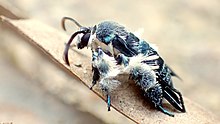Heterosphecia tawonoides, the oriental blue clearwing, is a moth of the family Sesiidae, in the genus Heterosphecia. The sesiids are mimics, in general appearance similar to a bee or wasp. This species was described in 2003 by Axel Kallies, from a specimen collected in 1887.
| Heterosphecia tawonoides | |
|---|---|

| |
| Male | |
| Scientific classification | |
| Domain: | Eukaryota |
| Kingdom: | Animalia |
| Phylum: | Arthropoda |
| Class: | Insecta |
| Order: | Lepidoptera |
| Family: | Sesiidae |
| Genus: | Heterosphecia |
| Species: | H. tawonoides
|
| Binomial name | |
| Heterosphecia tawonoides Kallies, 2003
| |
History
editHeterosphecia tawonoides was originally identified from a single damaged specimen collected from an unknown site in Sumatra in 1887. It was kept in the Natural History Museum, Vienna, and described by Axel Kallies in 2003.[1][2]
In 2013, Marta Skowron Volponi of the University of Gdańsk refound the moth on a lowland dipterocarp forest river bank in Malaysia.[2] It is likely that the moth gains some protection from predation by Batesian mimicry. The moth has been seen at Kuala Tahan and two other locations in Pahang, Malaysia.[3]
Distribution
editIt is known from Sumatra in Indonesia and Pahang in Malaysia.[3]
References
edit- ^ Kallies, A. (2003). "Three new species of Heterosphecia Le Cerf, 1916, from the Oriental Region (Lepidoptera: Sesiidae: Sesiinae)". Entomologische Zeitschrift. 113 (2): 34–37.
- ^ a b Barkham, Patrick (15 December 2017). "Lost species of bee-mimicking moth rediscovered after 130 years". The Guardian.
- ^ a b Volponi Skowron, Marta A; Volponi, Paolo (2017). "A 130-Year-Old Specimen Brought Back to Life: A Lost Species of Bee-Mimicking Clearwing Moth, Heterosphecia tawonoides (Lepidoptera: Sesiidae: Osminiini), Rediscovered in Peninsular Malaysia's Primary Rainforest". Tropical Conservation Science. 10: 194008291773977. doi:10.1177/1940082917739774. ISSN 1940-0829.